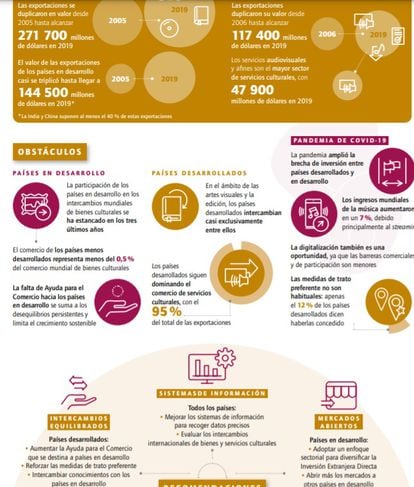Mobilization of workers from the entertainment world in Palma in September 2020 to request measures to help the sector to deal with losses due to the pandemic. EFE
Culture almost never has certainties.
Each premiere dreams of success, but faces the risk of failure.
And creator income often ebbs and flows, depending on the seasons.
Hence, the pandemic hit a sector with hardly any solid pillars particularly hard.
"The situation of many artists has gone from being precarious to unsustainable, endangering the diversity of creation," warns UNESCO, the United Nations agency specialized in culture, science and education, in a report published this Tuesday.
The study, titled
Re |
thinking about policies for creativity,
analyzes the global situation of the sector over 332 pages, with countless graphs, reflections, specific examples, some good news, but also a few red flags.
More information
The cultural sector in Belgium stars in the first successful rebellion against the closure by covid
“In countries for which data are available, revenues from the cultural and creative industries fell between 20% and 40% in 2020, and these sectors generally underperformed their respective national economies, for which have suffered more damage than during any previous crisis, ”says the investigation.
The most extreme translation of the data is the closure of cinemas, theaters, concert halls or galleries, which has affected the entire planet in these two years, in addition to the hundreds of shows, films, books, paintings, video games or comics that they never came to fruition.
But whoever remains standing does so amidst difficulties, according to UNESCO: “In 2020, the income obtained by creators decreased by more than 10%.”
“Since the pandemic was declared,
Another infographic from the UNESCO report.
The new storm also overwhelms unprotected creators.
Especially in Latin America: there, almost two out of three professionals in the sector (64%) are self-employed, according to the research.
In the EU, the percentage of freelancers in the arts drops to 33%, but still doubles the average for this type of employment in the general population (14%).
Spanish data, in line with European data, show that 66.8% of cultural employment is salaried, compared to 83.9% in the economy as a whole, according to the Ministry of Culture and Sports.
So much so that the report addresses a taboo subject for certain economists, but that others see as the only solution: “The crisis has led to calls for a universal basic income and a minimum wage that applies to all employment models in the cultural sectors. and creative.
Indeed,
The very subtitle of the study,
Raising culture as a global public good,
appeals to reinforce the importance of the arts for States.
Here, however, is a common paradox in the sector: culture always receives golden words, especially from politics, but the real gold has not just arrived.
"Public investment in culture has been declining for 10 years," denounces UNESCO, which also regrets that "insufficient or inadequate regulations and lack of skills in the digital environment increase inequalities."
Detail of one of the infographics of the UNESCO report.
Among the advances, yes, the text highlights "more integrated policies resulting from interministerial collaboration." Although the section includes a graph that may raise some questions about the structure of the Government of Spain: in the global review of the "policies and measures developed through interministerial cooperation", the department that least tends to work side by side with Culture is Sports —along with Health—, with 1%.
UNESCO dedicates a large part of its texts to underlining the social and economic importance of culture, which it considers as a potential engine for sustainable development and a fundamental vehicle for reducing inequalities.
However, sometimes the sector reiterates and reinforces the gaps it shares with the whole of society.
Thus, on the one hand, in 2019, world exports of all cultural services amounted to 117.4 billion dollars, double the figure for 2006. They continue to account for less than 2% of total services marketed.
And 95% of exports of cultural services are carried out by developed countries: the USA alone, specifically, accounts for 45%.
The text warns, however, that "this figure must be considered with caution, since many developing countries only communicate limited data (including, especially,
Another infographic from the UNESCO report.
Several issues that the text deals with are well known in the sector.
Although only the penetration of UNESCO allows us to obtain a global picture of the problems that each country faces and detects within its borders.
With steps forward, on the spot, or even backwards.
Thus, the organization states that "attacks on freedom of artistic expression continue to increase throughout the world, and range from censorship to murder."
The Rewrite Her Story
report is also cited
(Rewrite her story), which analyzed the 56 highest-grossing films from 20 countries in 2019, and found that only 27% of female characters appear as leaders compared to 42% of male characters. At the same time, "most Latin American countries, as well as Australia, Canada and Finland, have implemented measures to ensure greater cultural expression and greater access to culture for their indigenous populations."
Another example pointed out by UNESCO comes from Latin America: Latin Retina.
It is a "free streaming digital platform dedicated to Latin American cinema", carried out by the Ministry of Culture of Colombia, in collaboration with Bolivia, Ecuador, Peru, Mexico and Uruguay.
"You can access 8% of the catalog from all over the world and it offers free access for the public residing in Latin America and the Caribbean," the text informs.
Because culture suffers from common problems all over the planet.
But it also poses solutions, as research shows.
In Palestine, for example, the interdisciplinary Sakiya residency program
brings together creators, academics and farmers “to produce and share knowledge about the interactions between contemporary art, ecology and local self-sufficient agrarian traditions”.
And the Regional Theater of Oran, in Algeria, has invented a peculiar form of access: to get a ticket, you have to hand in a book.
In 2017 alone they collected 3,000.
Today, these works have new readers: they form the library of a pediatric hospital.









